Company Law Research: Good Faith and Proper Purpose (LAW00004)
VerifiedAdded on 2022/09/17
|7
|2491
|33
Report
AI Summary
This report delves into the critical aspects of company law in Australia, specifically examining the duties of company directors as outlined in the Corporations Act 2001. The core focus is on section 181, which mandates that directors act in 'good faith' and for a 'proper purpose.' The report dissects the meanings of these terms, emphasizing their significance in facilitating effective corporate governance. It explores the fiduciary relationship between directors and the company, highlighting the importance of acting honestly, sincerely, and in the best interests of the company as a whole, including shareholders, creditors, and employees. The analysis incorporates relevant case law, such as Mills v Mills, Greenhalgh v Arderne Cinemas Ltd, and Howard Smith Ltd V Ampol Petroleum Ltd, to illustrate the practical application and interpretation of these duties. Furthermore, the report addresses the concept of 'proper purpose,' underscoring the requirement for directors to exercise their powers appropriately, avoiding actions driven by personal gain or the manipulation of voting rights. The conclusion emphasizes the foundational role of these director duties in upholding trust and ensuring responsible corporate conduct.

COMPANY LAW
Paraphrase This Document
Need a fresh take? Get an instant paraphrase of this document with our AI Paraphraser
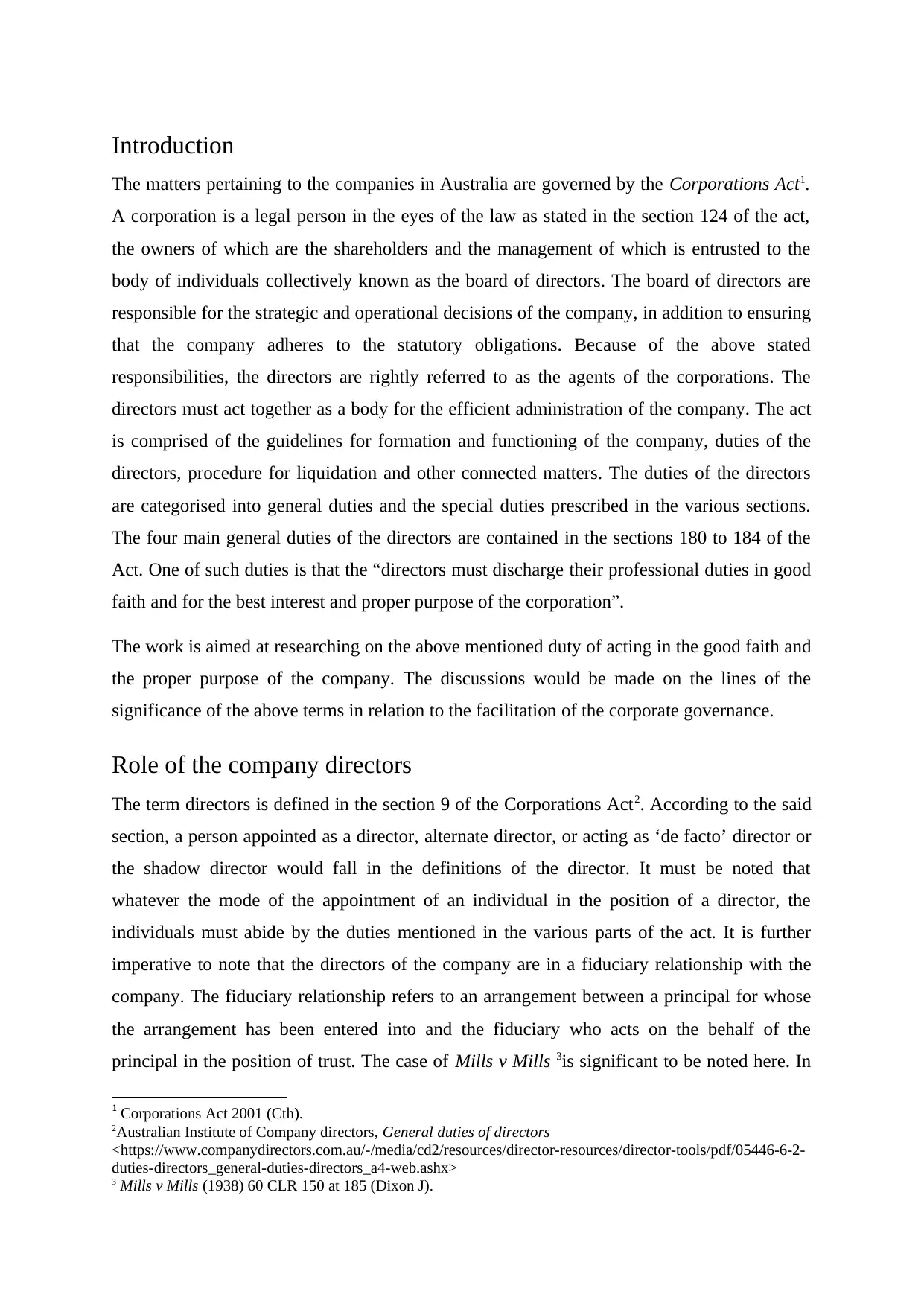
Introduction
The matters pertaining to the companies in Australia are governed by the Corporations Act1.
A corporation is a legal person in the eyes of the law as stated in the section 124 of the act,
the owners of which are the shareholders and the management of which is entrusted to the
body of individuals collectively known as the board of directors. The board of directors are
responsible for the strategic and operational decisions of the company, in addition to ensuring
that the company adheres to the statutory obligations. Because of the above stated
responsibilities, the directors are rightly referred to as the agents of the corporations. The
directors must act together as a body for the efficient administration of the company. The act
is comprised of the guidelines for formation and functioning of the company, duties of the
directors, procedure for liquidation and other connected matters. The duties of the directors
are categorised into general duties and the special duties prescribed in the various sections.
The four main general duties of the directors are contained in the sections 180 to 184 of the
Act. One of such duties is that the “directors must discharge their professional duties in good
faith and for the best interest and proper purpose of the corporation”.
The work is aimed at researching on the above mentioned duty of acting in the good faith and
the proper purpose of the company. The discussions would be made on the lines of the
significance of the above terms in relation to the facilitation of the corporate governance.
Role of the company directors
The term directors is defined in the section 9 of the Corporations Act2. According to the said
section, a person appointed as a director, alternate director, or acting as ‘de facto’ director or
the shadow director would fall in the definitions of the director. It must be noted that
whatever the mode of the appointment of an individual in the position of a director, the
individuals must abide by the duties mentioned in the various parts of the act. It is further
imperative to note that the directors of the company are in a fiduciary relationship with the
company. The fiduciary relationship refers to an arrangement between a principal for whose
the arrangement has been entered into and the fiduciary who acts on the behalf of the
principal in the position of trust. The case of Mills v Mills 3is significant to be noted here. In
1 Corporations Act 2001 (Cth).
2Australian Institute of Company directors, General duties of directors
<https://www.companydirectors.com.au/-/media/cd2/resources/director-resources/director-tools/pdf/05446-6-2-
duties-directors_general-duties-directors_a4-web.ashx>
3 Mills v Mills (1938) 60 CLR 150 at 185 (Dixon J).
The matters pertaining to the companies in Australia are governed by the Corporations Act1.
A corporation is a legal person in the eyes of the law as stated in the section 124 of the act,
the owners of which are the shareholders and the management of which is entrusted to the
body of individuals collectively known as the board of directors. The board of directors are
responsible for the strategic and operational decisions of the company, in addition to ensuring
that the company adheres to the statutory obligations. Because of the above stated
responsibilities, the directors are rightly referred to as the agents of the corporations. The
directors must act together as a body for the efficient administration of the company. The act
is comprised of the guidelines for formation and functioning of the company, duties of the
directors, procedure for liquidation and other connected matters. The duties of the directors
are categorised into general duties and the special duties prescribed in the various sections.
The four main general duties of the directors are contained in the sections 180 to 184 of the
Act. One of such duties is that the “directors must discharge their professional duties in good
faith and for the best interest and proper purpose of the corporation”.
The work is aimed at researching on the above mentioned duty of acting in the good faith and
the proper purpose of the company. The discussions would be made on the lines of the
significance of the above terms in relation to the facilitation of the corporate governance.
Role of the company directors
The term directors is defined in the section 9 of the Corporations Act2. According to the said
section, a person appointed as a director, alternate director, or acting as ‘de facto’ director or
the shadow director would fall in the definitions of the director. It must be noted that
whatever the mode of the appointment of an individual in the position of a director, the
individuals must abide by the duties mentioned in the various parts of the act. It is further
imperative to note that the directors of the company are in a fiduciary relationship with the
company. The fiduciary relationship refers to an arrangement between a principal for whose
the arrangement has been entered into and the fiduciary who acts on the behalf of the
principal in the position of trust. The case of Mills v Mills 3is significant to be noted here. In
1 Corporations Act 2001 (Cth).
2Australian Institute of Company directors, General duties of directors
<https://www.companydirectors.com.au/-/media/cd2/resources/director-resources/director-tools/pdf/05446-6-2-
duties-directors_general-duties-directors_a4-web.ashx>
3 Mills v Mills (1938) 60 CLR 150 at 185 (Dixon J).
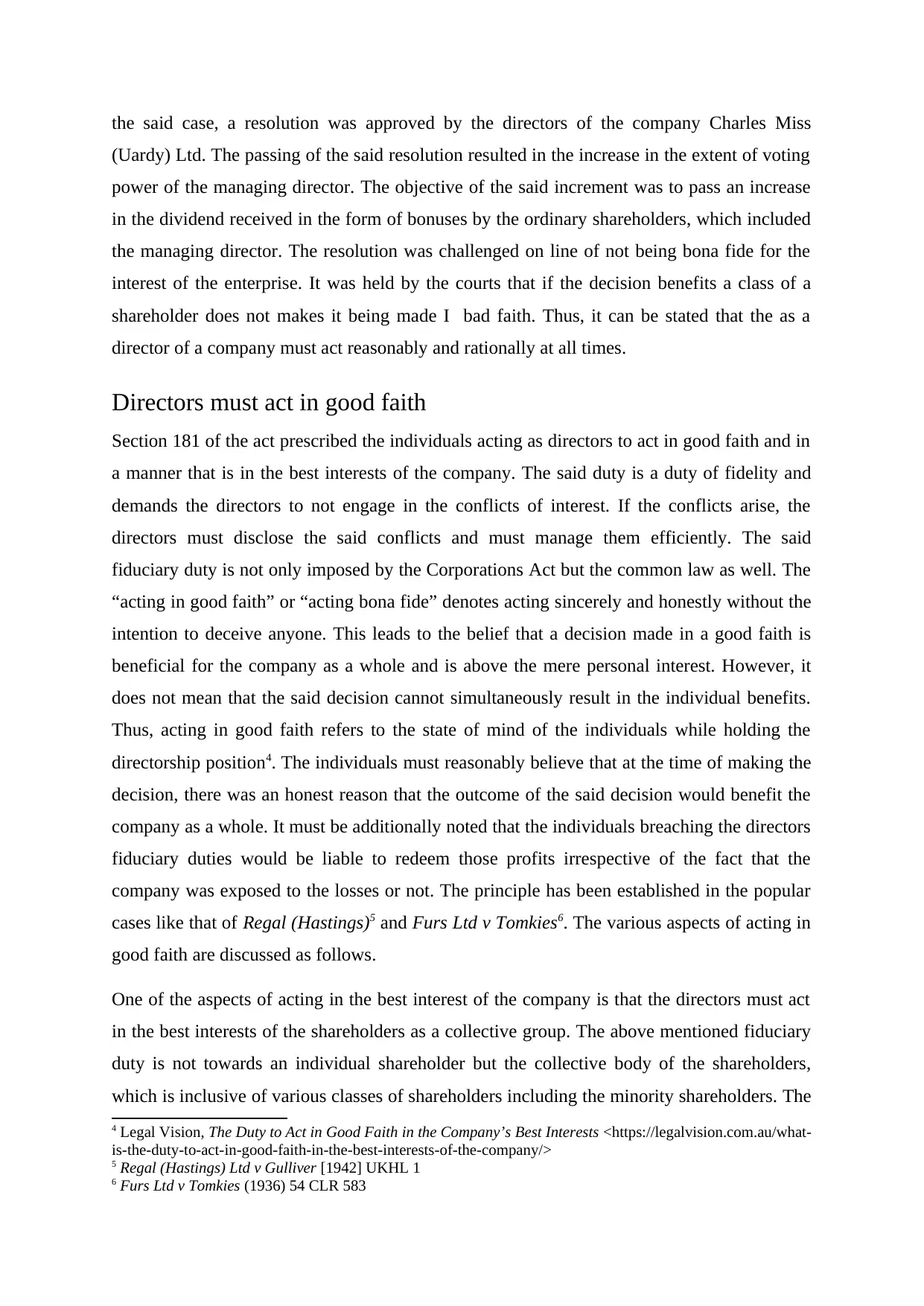
the said case, a resolution was approved by the directors of the company Charles Miss
(Uardy) Ltd. The passing of the said resolution resulted in the increase in the extent of voting
power of the managing director. The objective of the said increment was to pass an increase
in the dividend received in the form of bonuses by the ordinary shareholders, which included
the managing director. The resolution was challenged on line of not being bona fide for the
interest of the enterprise. It was held by the courts that if the decision benefits a class of a
shareholder does not makes it being made I bad faith. Thus, it can be stated that the as a
director of a company must act reasonably and rationally at all times.
Directors must act in good faith
Section 181 of the act prescribed the individuals acting as directors to act in good faith and in
a manner that is in the best interests of the company. The said duty is a duty of fidelity and
demands the directors to not engage in the conflicts of interest. If the conflicts arise, the
directors must disclose the said conflicts and must manage them efficiently. The said
fiduciary duty is not only imposed by the Corporations Act but the common law as well. The
“acting in good faith” or “acting bona fide” denotes acting sincerely and honestly without the
intention to deceive anyone. This leads to the belief that a decision made in a good faith is
beneficial for the company as a whole and is above the mere personal interest. However, it
does not mean that the said decision cannot simultaneously result in the individual benefits.
Thus, acting in good faith refers to the state of mind of the individuals while holding the
directorship position4. The individuals must reasonably believe that at the time of making the
decision, there was an honest reason that the outcome of the said decision would benefit the
company as a whole. It must be additionally noted that the individuals breaching the directors
fiduciary duties would be liable to redeem those profits irrespective of the fact that the
company was exposed to the losses or not. The principle has been established in the popular
cases like that of Regal (Hastings)5 and Furs Ltd v Tomkies6. The various aspects of acting in
good faith are discussed as follows.
One of the aspects of acting in the best interest of the company is that the directors must act
in the best interests of the shareholders as a collective group. The above mentioned fiduciary
duty is not towards an individual shareholder but the collective body of the shareholders,
which is inclusive of various classes of shareholders including the minority shareholders. The
4 Legal Vision, The Duty to Act in Good Faith in the Company’s Best Interests <https://legalvision.com.au/what-
is-the-duty-to-act-in-good-faith-in-the-best-interests-of-the-company/>
5 Regal (Hastings) Ltd v Gulliver [1942] UKHL 1
6 Furs Ltd v Tomkies (1936) 54 CLR 583
(Uardy) Ltd. The passing of the said resolution resulted in the increase in the extent of voting
power of the managing director. The objective of the said increment was to pass an increase
in the dividend received in the form of bonuses by the ordinary shareholders, which included
the managing director. The resolution was challenged on line of not being bona fide for the
interest of the enterprise. It was held by the courts that if the decision benefits a class of a
shareholder does not makes it being made I bad faith. Thus, it can be stated that the as a
director of a company must act reasonably and rationally at all times.
Directors must act in good faith
Section 181 of the act prescribed the individuals acting as directors to act in good faith and in
a manner that is in the best interests of the company. The said duty is a duty of fidelity and
demands the directors to not engage in the conflicts of interest. If the conflicts arise, the
directors must disclose the said conflicts and must manage them efficiently. The said
fiduciary duty is not only imposed by the Corporations Act but the common law as well. The
“acting in good faith” or “acting bona fide” denotes acting sincerely and honestly without the
intention to deceive anyone. This leads to the belief that a decision made in a good faith is
beneficial for the company as a whole and is above the mere personal interest. However, it
does not mean that the said decision cannot simultaneously result in the individual benefits.
Thus, acting in good faith refers to the state of mind of the individuals while holding the
directorship position4. The individuals must reasonably believe that at the time of making the
decision, there was an honest reason that the outcome of the said decision would benefit the
company as a whole. It must be additionally noted that the individuals breaching the directors
fiduciary duties would be liable to redeem those profits irrespective of the fact that the
company was exposed to the losses or not. The principle has been established in the popular
cases like that of Regal (Hastings)5 and Furs Ltd v Tomkies6. The various aspects of acting in
good faith are discussed as follows.
One of the aspects of acting in the best interest of the company is that the directors must act
in the best interests of the shareholders as a collective group. The above mentioned fiduciary
duty is not towards an individual shareholder but the collective body of the shareholders,
which is inclusive of various classes of shareholders including the minority shareholders. The
4 Legal Vision, The Duty to Act in Good Faith in the Company’s Best Interests <https://legalvision.com.au/what-
is-the-duty-to-act-in-good-faith-in-the-best-interests-of-the-company/>
5 Regal (Hastings) Ltd v Gulliver [1942] UKHL 1
6 Furs Ltd v Tomkies (1936) 54 CLR 583
⊘ This is a preview!⊘
Do you want full access?
Subscribe today to unlock all pages.

Trusted by 1+ million students worldwide
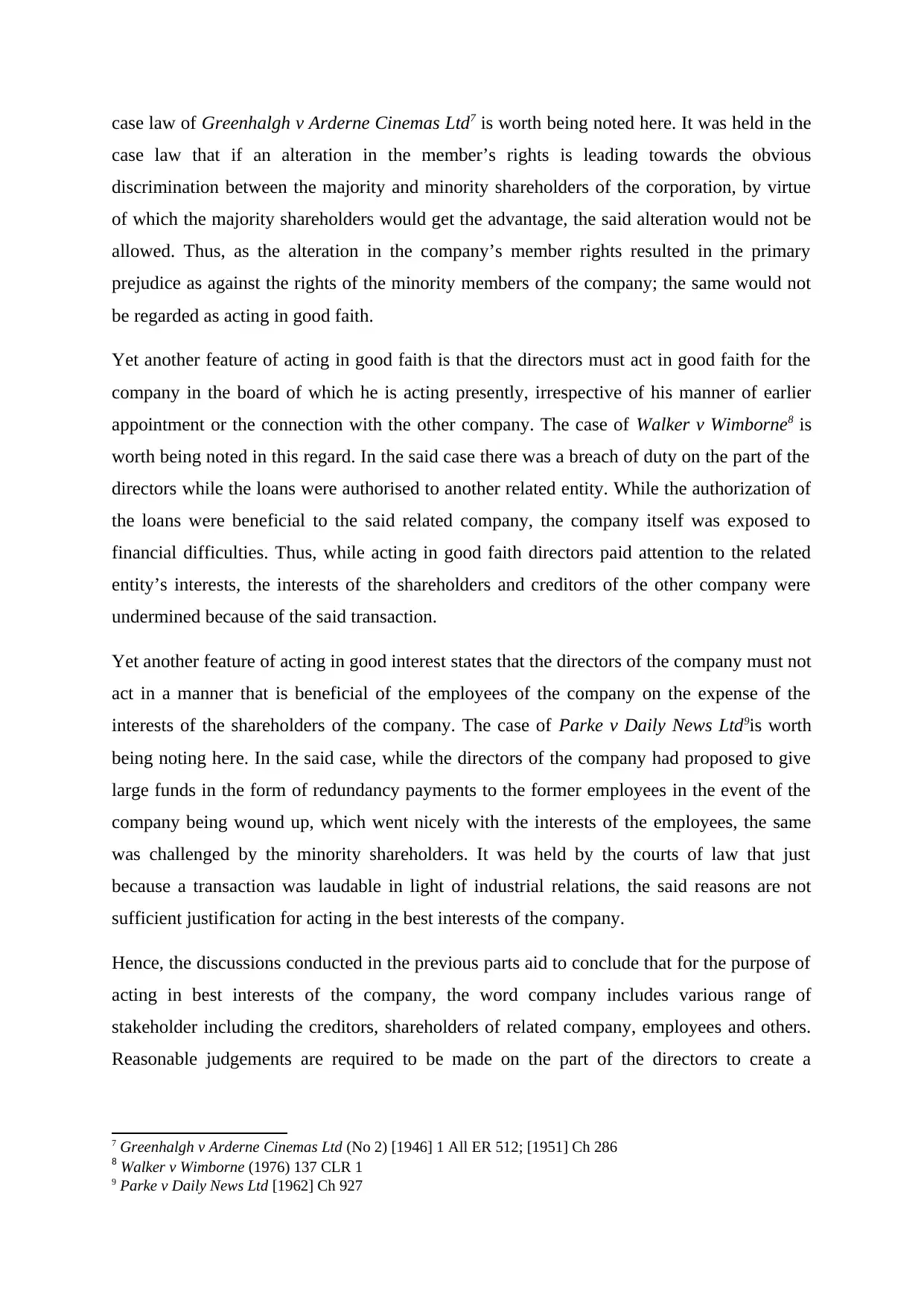
case law of Greenhalgh v Arderne Cinemas Ltd7 is worth being noted here. It was held in the
case law that if an alteration in the member’s rights is leading towards the obvious
discrimination between the majority and minority shareholders of the corporation, by virtue
of which the majority shareholders would get the advantage, the said alteration would not be
allowed. Thus, as the alteration in the company’s member rights resulted in the primary
prejudice as against the rights of the minority members of the company; the same would not
be regarded as acting in good faith.
Yet another feature of acting in good faith is that the directors must act in good faith for the
company in the board of which he is acting presently, irrespective of his manner of earlier
appointment or the connection with the other company. The case of Walker v Wimborne8 is
worth being noted in this regard. In the said case there was a breach of duty on the part of the
directors while the loans were authorised to another related entity. While the authorization of
the loans were beneficial to the said related company, the company itself was exposed to
financial difficulties. Thus, while acting in good faith directors paid attention to the related
entity’s interests, the interests of the shareholders and creditors of the other company were
undermined because of the said transaction.
Yet another feature of acting in good interest states that the directors of the company must not
act in a manner that is beneficial of the employees of the company on the expense of the
interests of the shareholders of the company. The case of Parke v Daily News Ltd9is worth
being noting here. In the said case, while the directors of the company had proposed to give
large funds in the form of redundancy payments to the former employees in the event of the
company being wound up, which went nicely with the interests of the employees, the same
was challenged by the minority shareholders. It was held by the courts of law that just
because a transaction was laudable in light of industrial relations, the said reasons are not
sufficient justification for acting in the best interests of the company.
Hence, the discussions conducted in the previous parts aid to conclude that for the purpose of
acting in best interests of the company, the word company includes various range of
stakeholder including the creditors, shareholders of related company, employees and others.
Reasonable judgements are required to be made on the part of the directors to create a
7 Greenhalgh v Arderne Cinemas Ltd (No 2) [1946] 1 All ER 512; [1951] Ch 286
8 Walker v Wimborne (1976) 137 CLR 1
9 Parke v Daily News Ltd [1962] Ch 927
case law that if an alteration in the member’s rights is leading towards the obvious
discrimination between the majority and minority shareholders of the corporation, by virtue
of which the majority shareholders would get the advantage, the said alteration would not be
allowed. Thus, as the alteration in the company’s member rights resulted in the primary
prejudice as against the rights of the minority members of the company; the same would not
be regarded as acting in good faith.
Yet another feature of acting in good faith is that the directors must act in good faith for the
company in the board of which he is acting presently, irrespective of his manner of earlier
appointment or the connection with the other company. The case of Walker v Wimborne8 is
worth being noted in this regard. In the said case there was a breach of duty on the part of the
directors while the loans were authorised to another related entity. While the authorization of
the loans were beneficial to the said related company, the company itself was exposed to
financial difficulties. Thus, while acting in good faith directors paid attention to the related
entity’s interests, the interests of the shareholders and creditors of the other company were
undermined because of the said transaction.
Yet another feature of acting in good interest states that the directors of the company must not
act in a manner that is beneficial of the employees of the company on the expense of the
interests of the shareholders of the company. The case of Parke v Daily News Ltd9is worth
being noting here. In the said case, while the directors of the company had proposed to give
large funds in the form of redundancy payments to the former employees in the event of the
company being wound up, which went nicely with the interests of the employees, the same
was challenged by the minority shareholders. It was held by the courts of law that just
because a transaction was laudable in light of industrial relations, the said reasons are not
sufficient justification for acting in the best interests of the company.
Hence, the discussions conducted in the previous parts aid to conclude that for the purpose of
acting in best interests of the company, the word company includes various range of
stakeholder including the creditors, shareholders of related company, employees and others.
Reasonable judgements are required to be made on the part of the directors to create a
7 Greenhalgh v Arderne Cinemas Ltd (No 2) [1946] 1 All ER 512; [1951] Ch 286
8 Walker v Wimborne (1976) 137 CLR 1
9 Parke v Daily News Ltd [1962] Ch 927
Paraphrase This Document
Need a fresh take? Get an instant paraphrase of this document with our AI Paraphraser
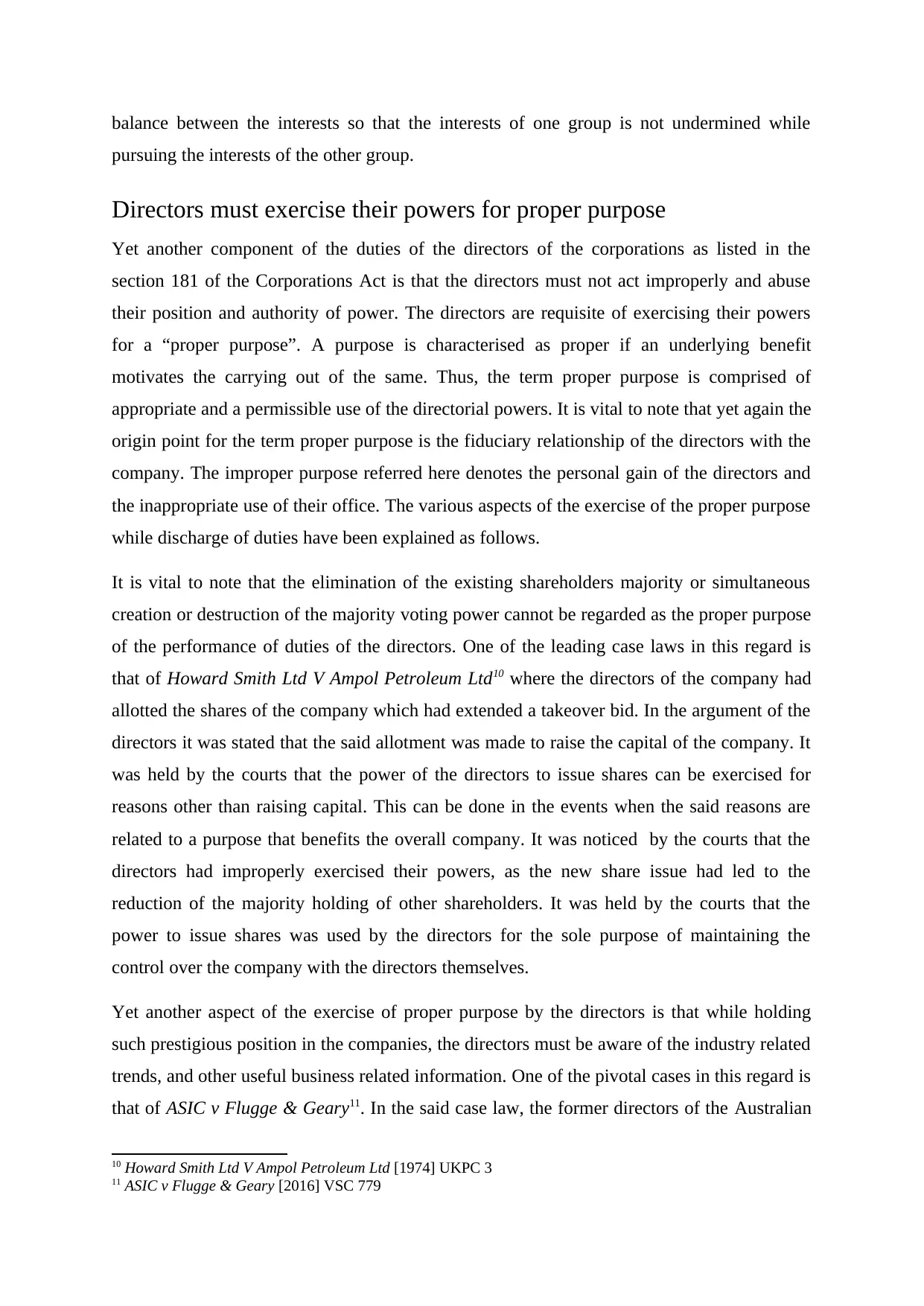
balance between the interests so that the interests of one group is not undermined while
pursuing the interests of the other group.
Directors must exercise their powers for proper purpose
Yet another component of the duties of the directors of the corporations as listed in the
section 181 of the Corporations Act is that the directors must not act improperly and abuse
their position and authority of power. The directors are requisite of exercising their powers
for a “proper purpose”. A purpose is characterised as proper if an underlying benefit
motivates the carrying out of the same. Thus, the term proper purpose is comprised of
appropriate and a permissible use of the directorial powers. It is vital to note that yet again the
origin point for the term proper purpose is the fiduciary relationship of the directors with the
company. The improper purpose referred here denotes the personal gain of the directors and
the inappropriate use of their office. The various aspects of the exercise of the proper purpose
while discharge of duties have been explained as follows.
It is vital to note that the elimination of the existing shareholders majority or simultaneous
creation or destruction of the majority voting power cannot be regarded as the proper purpose
of the performance of duties of the directors. One of the leading case laws in this regard is
that of Howard Smith Ltd V Ampol Petroleum Ltd10 where the directors of the company had
allotted the shares of the company which had extended a takeover bid. In the argument of the
directors it was stated that the said allotment was made to raise the capital of the company. It
was held by the courts that the power of the directors to issue shares can be exercised for
reasons other than raising capital. This can be done in the events when the said reasons are
related to a purpose that benefits the overall company. It was noticed by the courts that the
directors had improperly exercised their powers, as the new share issue had led to the
reduction of the majority holding of other shareholders. It was held by the courts that the
power to issue shares was used by the directors for the sole purpose of maintaining the
control over the company with the directors themselves.
Yet another aspect of the exercise of proper purpose by the directors is that while holding
such prestigious position in the companies, the directors must be aware of the industry related
trends, and other useful business related information. One of the pivotal cases in this regard is
that of ASIC v Flugge & Geary11. In the said case law, the former directors of the Australian
10 Howard Smith Ltd V Ampol Petroleum Ltd [1974] UKPC 3
11 ASIC v Flugge & Geary [2016] VSC 779
pursuing the interests of the other group.
Directors must exercise their powers for proper purpose
Yet another component of the duties of the directors of the corporations as listed in the
section 181 of the Corporations Act is that the directors must not act improperly and abuse
their position and authority of power. The directors are requisite of exercising their powers
for a “proper purpose”. A purpose is characterised as proper if an underlying benefit
motivates the carrying out of the same. Thus, the term proper purpose is comprised of
appropriate and a permissible use of the directorial powers. It is vital to note that yet again the
origin point for the term proper purpose is the fiduciary relationship of the directors with the
company. The improper purpose referred here denotes the personal gain of the directors and
the inappropriate use of their office. The various aspects of the exercise of the proper purpose
while discharge of duties have been explained as follows.
It is vital to note that the elimination of the existing shareholders majority or simultaneous
creation or destruction of the majority voting power cannot be regarded as the proper purpose
of the performance of duties of the directors. One of the leading case laws in this regard is
that of Howard Smith Ltd V Ampol Petroleum Ltd10 where the directors of the company had
allotted the shares of the company which had extended a takeover bid. In the argument of the
directors it was stated that the said allotment was made to raise the capital of the company. It
was held by the courts that the power of the directors to issue shares can be exercised for
reasons other than raising capital. This can be done in the events when the said reasons are
related to a purpose that benefits the overall company. It was noticed by the courts that the
directors had improperly exercised their powers, as the new share issue had led to the
reduction of the majority holding of other shareholders. It was held by the courts that the
power to issue shares was used by the directors for the sole purpose of maintaining the
control over the company with the directors themselves.
Yet another aspect of the exercise of proper purpose by the directors is that while holding
such prestigious position in the companies, the directors must be aware of the industry related
trends, and other useful business related information. One of the pivotal cases in this regard is
that of ASIC v Flugge & Geary11. In the said case law, the former directors of the Australian
10 Howard Smith Ltd V Ampol Petroleum Ltd [1974] UKPC 3
11 ASIC v Flugge & Geary [2016] VSC 779
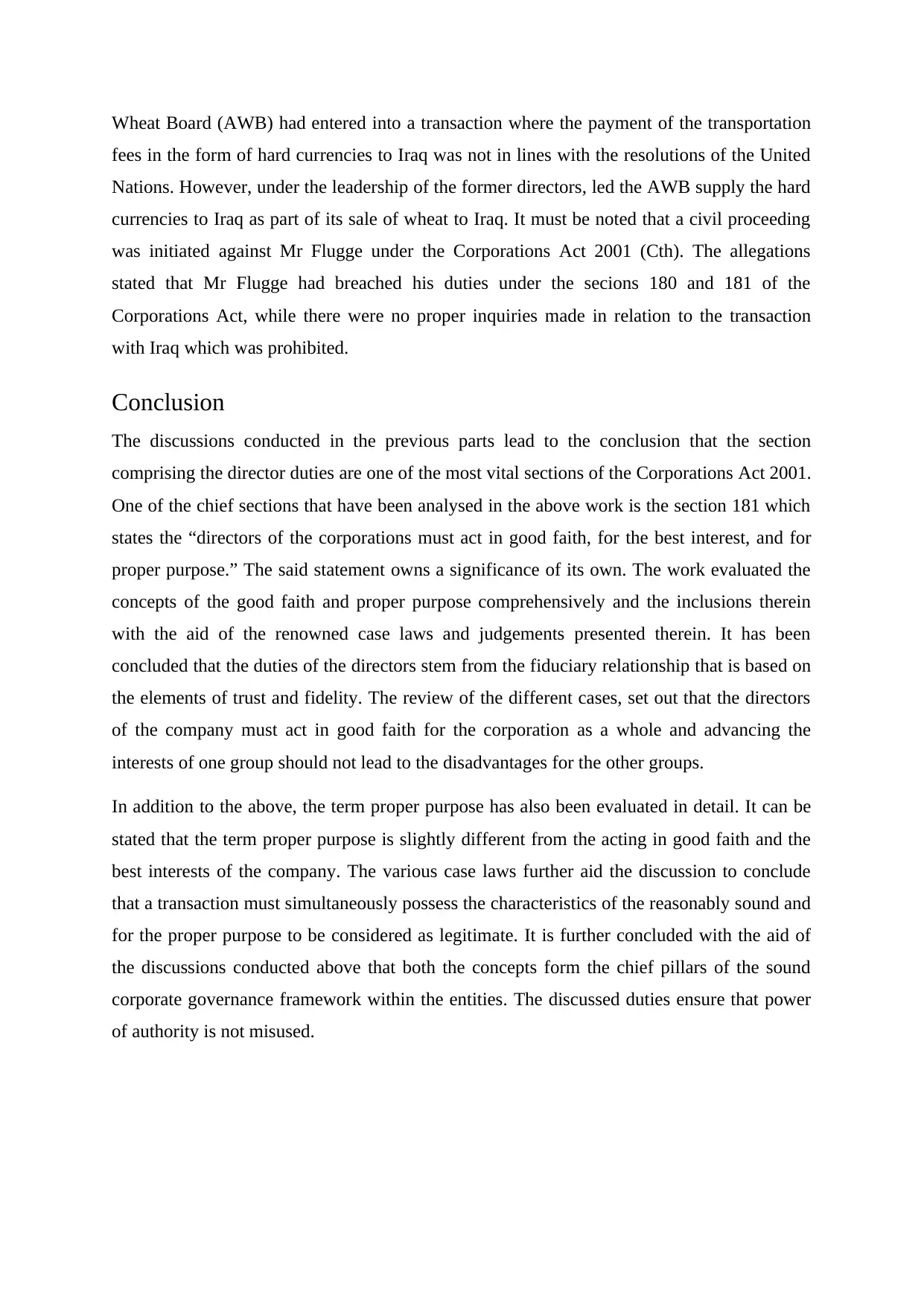
Wheat Board (AWB) had entered into a transaction where the payment of the transportation
fees in the form of hard currencies to Iraq was not in lines with the resolutions of the United
Nations. However, under the leadership of the former directors, led the AWB supply the hard
currencies to Iraq as part of its sale of wheat to Iraq. It must be noted that a civil proceeding
was initiated against Mr Flugge under the Corporations Act 2001 (Cth). The allegations
stated that Mr Flugge had breached his duties under the secions 180 and 181 of the
Corporations Act, while there were no proper inquiries made in relation to the transaction
with Iraq which was prohibited.
Conclusion
The discussions conducted in the previous parts lead to the conclusion that the section
comprising the director duties are one of the most vital sections of the Corporations Act 2001.
One of the chief sections that have been analysed in the above work is the section 181 which
states the “directors of the corporations must act in good faith, for the best interest, and for
proper purpose.” The said statement owns a significance of its own. The work evaluated the
concepts of the good faith and proper purpose comprehensively and the inclusions therein
with the aid of the renowned case laws and judgements presented therein. It has been
concluded that the duties of the directors stem from the fiduciary relationship that is based on
the elements of trust and fidelity. The review of the different cases, set out that the directors
of the company must act in good faith for the corporation as a whole and advancing the
interests of one group should not lead to the disadvantages for the other groups.
In addition to the above, the term proper purpose has also been evaluated in detail. It can be
stated that the term proper purpose is slightly different from the acting in good faith and the
best interests of the company. The various case laws further aid the discussion to conclude
that a transaction must simultaneously possess the characteristics of the reasonably sound and
for the proper purpose to be considered as legitimate. It is further concluded with the aid of
the discussions conducted above that both the concepts form the chief pillars of the sound
corporate governance framework within the entities. The discussed duties ensure that power
of authority is not misused.
fees in the form of hard currencies to Iraq was not in lines with the resolutions of the United
Nations. However, under the leadership of the former directors, led the AWB supply the hard
currencies to Iraq as part of its sale of wheat to Iraq. It must be noted that a civil proceeding
was initiated against Mr Flugge under the Corporations Act 2001 (Cth). The allegations
stated that Mr Flugge had breached his duties under the secions 180 and 181 of the
Corporations Act, while there were no proper inquiries made in relation to the transaction
with Iraq which was prohibited.
Conclusion
The discussions conducted in the previous parts lead to the conclusion that the section
comprising the director duties are one of the most vital sections of the Corporations Act 2001.
One of the chief sections that have been analysed in the above work is the section 181 which
states the “directors of the corporations must act in good faith, for the best interest, and for
proper purpose.” The said statement owns a significance of its own. The work evaluated the
concepts of the good faith and proper purpose comprehensively and the inclusions therein
with the aid of the renowned case laws and judgements presented therein. It has been
concluded that the duties of the directors stem from the fiduciary relationship that is based on
the elements of trust and fidelity. The review of the different cases, set out that the directors
of the company must act in good faith for the corporation as a whole and advancing the
interests of one group should not lead to the disadvantages for the other groups.
In addition to the above, the term proper purpose has also been evaluated in detail. It can be
stated that the term proper purpose is slightly different from the acting in good faith and the
best interests of the company. The various case laws further aid the discussion to conclude
that a transaction must simultaneously possess the characteristics of the reasonably sound and
for the proper purpose to be considered as legitimate. It is further concluded with the aid of
the discussions conducted above that both the concepts form the chief pillars of the sound
corporate governance framework within the entities. The discussed duties ensure that power
of authority is not misused.
⊘ This is a preview!⊘
Do you want full access?
Subscribe today to unlock all pages.

Trusted by 1+ million students worldwide
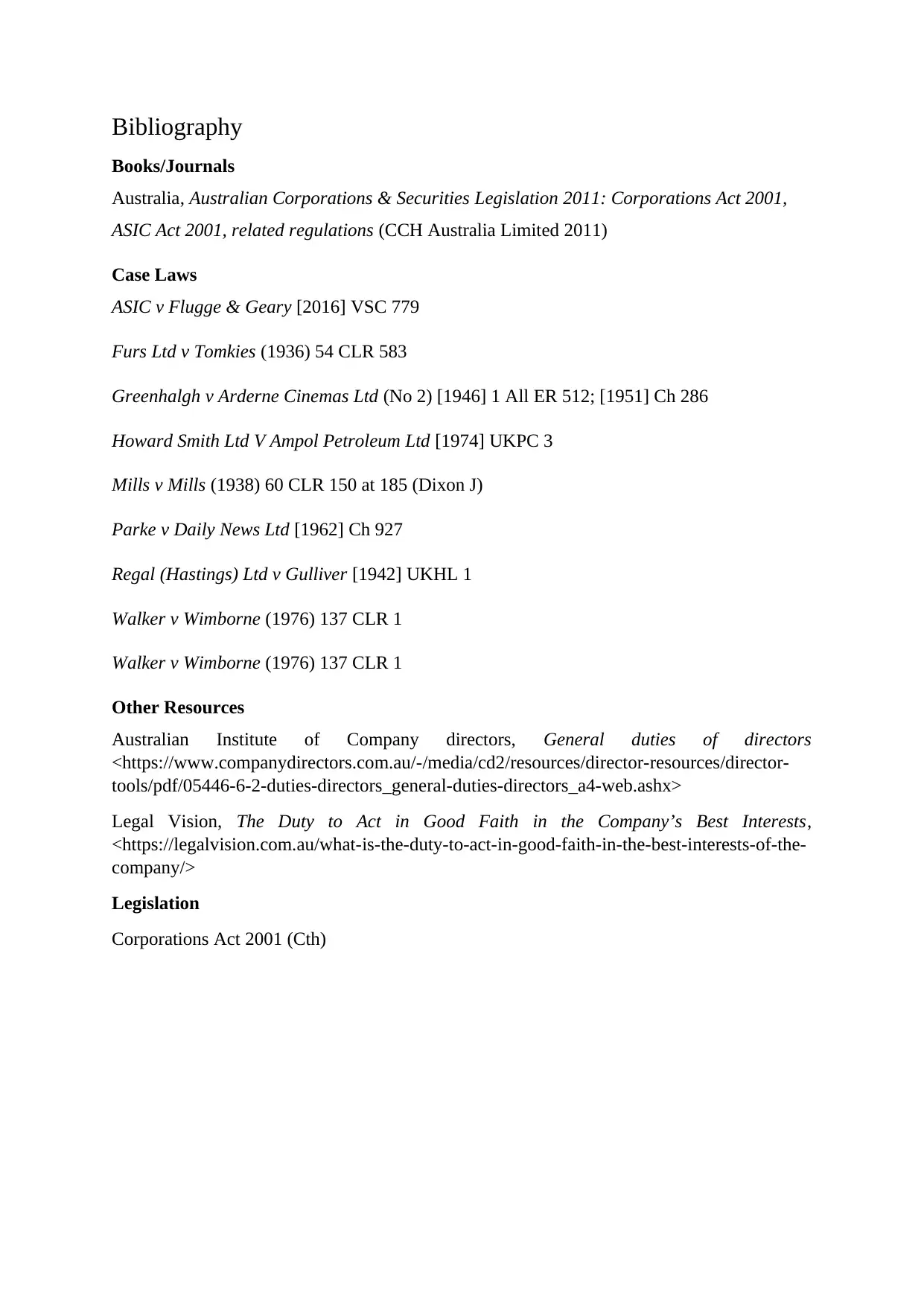
Bibliography
Books/Journals
Australia, Australian Corporations & Securities Legislation 2011: Corporations Act 2001,
ASIC Act 2001, related regulations (CCH Australia Limited 2011)
Case Laws
ASIC v Flugge & Geary [2016] VSC 779
Furs Ltd v Tomkies (1936) 54 CLR 583
Greenhalgh v Arderne Cinemas Ltd (No 2) [1946] 1 All ER 512; [1951] Ch 286
Howard Smith Ltd V Ampol Petroleum Ltd [1974] UKPC 3
Mills v Mills (1938) 60 CLR 150 at 185 (Dixon J)
Parke v Daily News Ltd [1962] Ch 927
Regal (Hastings) Ltd v Gulliver [1942] UKHL 1
Walker v Wimborne (1976) 137 CLR 1
Walker v Wimborne (1976) 137 CLR 1
Other Resources
Australian Institute of Company directors, General duties of directors
<https://www.companydirectors.com.au/-/media/cd2/resources/director-resources/director-
tools/pdf/05446-6-2-duties-directors_general-duties-directors_a4-web.ashx>
Legal Vision, The Duty to Act in Good Faith in the Company’s Best Interests,
<https://legalvision.com.au/what-is-the-duty-to-act-in-good-faith-in-the-best-interests-of-the-
company/>
Legislation
Corporations Act 2001 (Cth)
Books/Journals
Australia, Australian Corporations & Securities Legislation 2011: Corporations Act 2001,
ASIC Act 2001, related regulations (CCH Australia Limited 2011)
Case Laws
ASIC v Flugge & Geary [2016] VSC 779
Furs Ltd v Tomkies (1936) 54 CLR 583
Greenhalgh v Arderne Cinemas Ltd (No 2) [1946] 1 All ER 512; [1951] Ch 286
Howard Smith Ltd V Ampol Petroleum Ltd [1974] UKPC 3
Mills v Mills (1938) 60 CLR 150 at 185 (Dixon J)
Parke v Daily News Ltd [1962] Ch 927
Regal (Hastings) Ltd v Gulliver [1942] UKHL 1
Walker v Wimborne (1976) 137 CLR 1
Walker v Wimborne (1976) 137 CLR 1
Other Resources
Australian Institute of Company directors, General duties of directors
<https://www.companydirectors.com.au/-/media/cd2/resources/director-resources/director-
tools/pdf/05446-6-2-duties-directors_general-duties-directors_a4-web.ashx>
Legal Vision, The Duty to Act in Good Faith in the Company’s Best Interests,
<https://legalvision.com.au/what-is-the-duty-to-act-in-good-faith-in-the-best-interests-of-the-
company/>
Legislation
Corporations Act 2001 (Cth)
1 out of 7
Related Documents
Your All-in-One AI-Powered Toolkit for Academic Success.
+13062052269
info@desklib.com
Available 24*7 on WhatsApp / Email
![[object Object]](/_next/static/media/star-bottom.7253800d.svg)
Unlock your academic potential
Copyright © 2020–2026 A2Z Services. All Rights Reserved. Developed and managed by ZUCOL.





